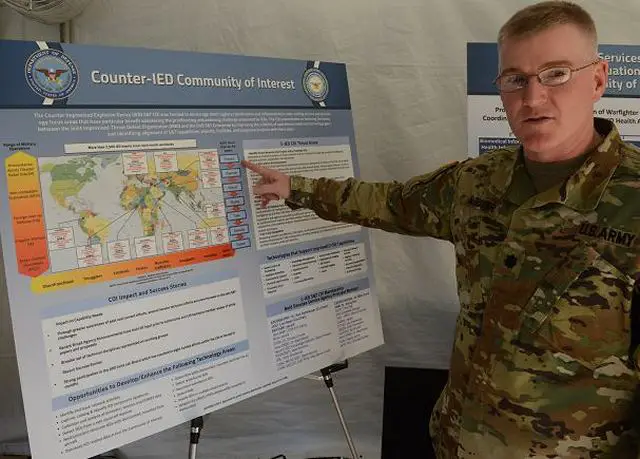Breaking news
US Army JIDO seeks solutions to defeat threats IEDs drones 13006172.
| 2017
|
|
|||
|
Defense & Security News - United States
|
|||
|
|
|||
|
U.S. Army JIDO seeks new solutions to defeat improvised threats as IEDs and drones.
|
|||
|
U.S. Army JIDO (Joint Improvised-Threat Defeat Organization) seek to defeat host of improvised threats as unmanned aerial vehicles and IEDs. On average, there are about 2,500 IED attacks every month worldwide, according to Lt. Col. James McGuyer. Last year the Islamic State began flying unmanned aerial vehicles over friendly forces in Mosul, Iraq.
|
|||
|
|
|||
 On average, there are about 2,500 IED attacks every month worldwide, according to Lt. Col. James McGuyer, deputy chief for Technology Strategy Division, Joint Improvised-Threat Defeat Organization, |
|||
|
|
|||
|
JIDO (Joint Improvised-Threat Defeat Organization) is a relatively new organization, formed a little more than a year ago out of the Joint IED Defeat Organization. JIEDDO itself was created in 2006, as coalition forces in Afghanistan and Iraq faced growing dangers from IEDs.
JIDO had anticipated such attacks for several years, McGuyer noted. Therefore, the Iraqi army and its coalition partners had the means to counter the UAV threat. The number of IED attack shows that while enemy combatants may not have the sophisticated weapons that are available in the U.S. arsenal, they are adapting, improvising, and improving effective weapons out of locally available materials. The enemy's ability to adapt includes efforts to branch out to other means of attack besides the IED, said McGuyer, speaking during Lab Day at the Pentagon last month. McGuyer currently serves as deputy chief for Technology Strategy Division, Joint Improvised-Threat Defeat Organization, known as JIDO, at Fort Belvoir, Virginia. Besides anticipating new challenges, JIDO also focuses on current threats in Iraq, Afghanistan, Syria, and elsewhere, McGuyer noted. One of the main efforts that JIDO oversees in these places is the tracking of materials and methods used for making explosive devices. For example, there are signatures for the wires, triggers, casings and even explosive materials like ammonium nitrate fertilizer, he said. Tracking the source can lead to cutting off the supplies and perhaps even locating the funding sources and perpetrators. JIDO shares that information with the combatant commanders and with the friendly governments. |
|||


























